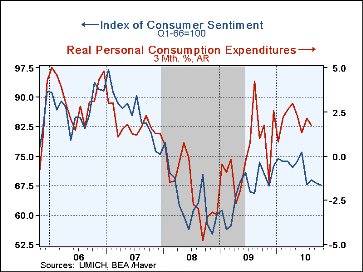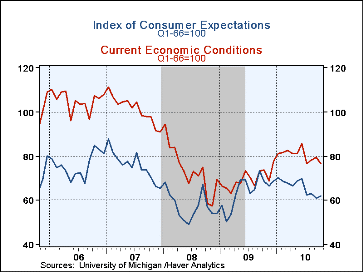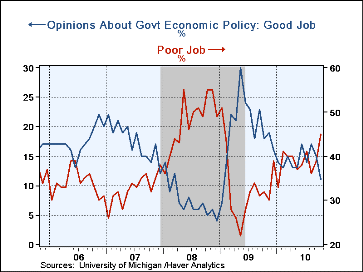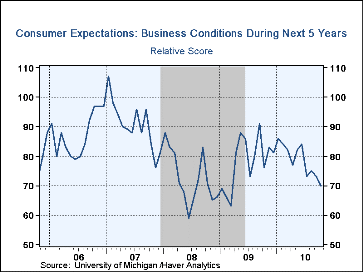 Global| Oct 29 2010
Global| Oct 29 2010Consumer Sentiment Drifts Sideways
by:Tom Moeller
|in:Economy in Brief
Summary
Consumer sentiment has been unchanged for the last four months. The University of Michigan Index of Consumer Sentiment reported that its full month measure for October declined versus September to 67.7, about its level during July. [...]
Consumer sentiment has been unchanged for the last four months. The University of Michigan Index of Consumer Sentiment reported that its full month measure for October declined versus September to 67.7, about its level during July. The latest level slipped from the mid-month reading and also was slightly below expectations for a reading of 68.0. This uninspiring performance helps explain the recently mediocre gains in real consumer spending. During the last ten years there has been a 63% correlation between the level of sentiment and the three-month growth in real consumer spending, recently 1.8%.
The near stability of the monthly sentiment figure reflected slight
divergence between the two major series' components, as well as its
sub-components. The current conditions figure slipped to 76.6 from 79.6 as
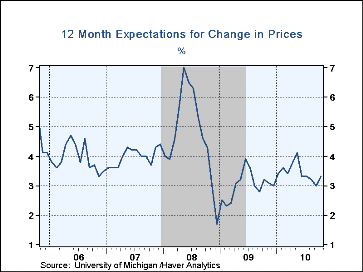 buying conditions for large household goods fell to its lowest level since
November 2009. The assessment of current personal finances also deteriorated,
but just a little to its lowest since July. This level sustains a modestly
firming trend in place since the middle of last year.
buying conditions for large household goods fell to its lowest level since
November 2009. The assessment of current personal finances also deteriorated,
but just a little to its lowest since July. This level sustains a modestly
firming trend in place since the middle of last year.
In contrast, the consumer expectations index rose to 61.9 from 60.9 in September, though the latest was lower than the mid-month reading. Feelings about business condition during the next twelve months rose from September but remained below August. The expected change in personal finances also rose to its highest level since June. Then some despair set into the readings. For the next five years expected business conditions were at the lowest level since March of 2009.
Expected price inflation during the next year edged back up to 3.3% from 3.0% in September. Notice that this figure bears little resemblance to the current pace of CPI inflation, 1.1% over the last year. Recent experience is not being extrapolated. Respondents' view of government policy, which may eventually influence economic expectations, fell further this month to 66 from 76 in September; this latest is the lowest reading since January 2009. Only 11% of respondents think that a good job was being done by government while 45% thought a poor job was being done, the most since January 2009.
The Reuters/University of Michigan survey data are not seasonally adjusted. The readings are based on telephone interviews with just over 300 households during early-to-mid October. The summary indexes are in Haver's USECON database with details in the proprietary UMSCA database.
| University of Michigan | Oct. | Mid-Oct | Sep. | Aug. | Oct. Y/Y % |
2009 | 2008 | 2007 |
|---|---|---|---|---|---|---|---|---|
| Consumer Sentiment | 67.7 | 67.9 | 68.2 | 68.9 | -4.1 | 66.3 | 63.8 | 85.6 |
| Current Economic Conditions | 76.6 | 73.0 | 79.6 | 78.3 | 3.9 | 69.6 | 73.7 | 101.2 |
| Expectations | 61.9 | 64.6 | 60.9 | 62.9 | -9.8 | 64.1 | 57.3 | 75.6 |
Tom Moeller
AuthorMore in Author Profile »Prior to joining Haver Analytics in 2000, Mr. Moeller worked as the Economist at Chancellor Capital Management from 1985 to 1999. There, he developed comprehensive economic forecasts and interpreted economic data for equity and fixed income portfolio managers. Also at Chancellor, Mr. Moeller worked as an equity analyst and was responsible for researching and rating companies in the economically sensitive automobile and housing industries for investment in Chancellor’s equity portfolio. Prior to joining Chancellor, Mr. Moeller was an Economist at Citibank from 1979 to 1984. He also analyzed pricing behavior in the metals industry for the Council on Wage and Price Stability in Washington, D.C. In 1999, Mr. Moeller received the award for most accurate forecast from the Forecasters' Club of New York. From 1990 to 1992 he was President of the New York Association for Business Economists. Mr. Moeller earned an M.B.A. in Finance from Fordham University, where he graduated in 1987. He holds a Bachelor of Arts in Economics from George Washington University.
More Economy in Brief
 Global| Feb 05 2026
Global| Feb 05 2026Charts of the Week: Balanced Policy, Resilient Data and AI Narratives
by:Andrew Cates


